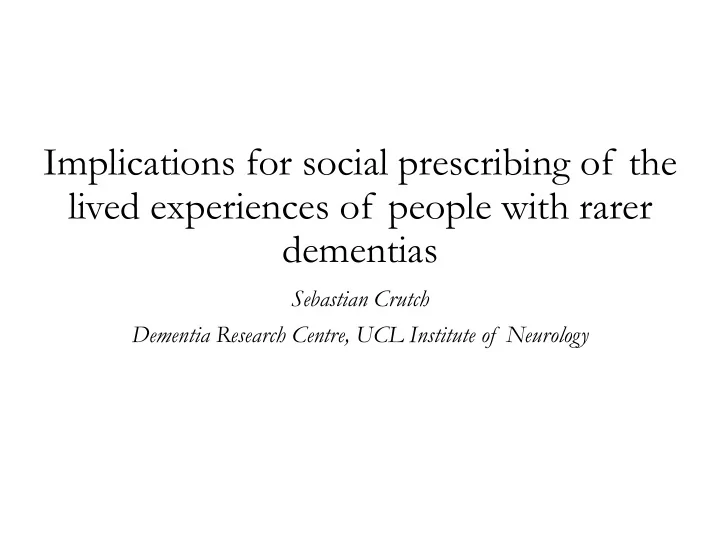

Implications for social prescribing of the lived experiences of people with rarer dementias Sebastian Crutch Dementia Research Centre, UCL Institute of Neurology
Memory Personality, reasoning Language Vision (e.g. typical AD) (e.g. FTD) (e.g. PPA) (e.g. PCA) The person, the condition and so much more
PCA Support Group Meeting, The Hub, Wellcome Collection, November 2017 “Am I the only one with this?”
The impact of multicomponent support groups for those living with rare dementias Funders: Economic and Social Research Council (ESRC) & National Institute for Health Research (NIHR) Timeframe: 5 years (January 2019 – December 2023) Summary: First major study of the value of support groups for people living with or caring for someone with a rare form of dementia. We will be looking at the benefits of meeting other people living with a similar condition, and sharing practical and emotional support. Workstreams: • WS1: Retrospective cohort study (>1000 RDS members) • WS2: Theoretical development (Theories of change) • WS3: Measures development (e.g. resilience) • WS4: Prospective longitudinal study (N=720; 24-48 months) • WS5: Novel interventions (e.g. online support for FTD carers) • WS6: Economic analysis of cost effectiveness 4
Psychosocial consequences of changes in practical activities: dependence, independence, interdependence
“Somebody who was perhaps a hundred percent academic - and good luck to them doing things that I couldn’t do - but who wouldn’t know which end of a screwdriver to hold wouldn’t miss not being able to do those things, whereas everything you see in this house I built and now I’m just totally useless at all these things, it’s so frustrating to me” Psychosocial consequences of changes in practical activities: identity
Psychosocial consequences of changes in practical activities: identity
Meaningful and social
Adapting not necessarily avoiding
Social prescribing case study (thanks to Nikki Zimmermann) Gentleman 71, diagnosed with LPA 3 years ago Speech problems limited engagement in amateur dramatics & associated with low mood Tried an art class to find a new hobby and reduce anxiety/depression Found sense of achievement, enjoyed non verbal expression, looked forward to classes, and started drawing at home, in parks etc. Received Student of the Year Award from the College …and discovering something old, e.g. communication partner training with Discovering something new
Nothing local is not the same as nothing available
cARTrefu carer: “It made me realise residents are more capable than one might give them credit for.” https://www.ageuk.org.uk/cymru/our-work/arts-and-creativity/cartrefu/ Social prescribing FOR not just BY healthcare professionals
Scientist Artist Arts audiences Lived Science audiences experience Education audiences People living with Lived Lived experience experience Social prescribing FOR professionals BY those with a lived experience
Do I See What You See? by Simon Ball (2018) Trina Simon Jon Williamson Valerie Graeme Kailey Armstrong Ball & Lori Hayden Blumenthal Armstrong Nolan Do I See What You See? Simon Ball, 2018 http://www.createdoutofmind.org/stories-and-reflections/do-i-see-what-you-see
Scientist Artist Arts audiences Lived Science audiences experience Education audiences People living with Lived Lived Family & friends experience experience Care home staff NHS trust staff Social prescribing FOR professionals BY those with a lived experience
What should we expect from evidence?
Self-rated Well-Being 440 Mean CWS composite wellbeing score 430 420 * 410 400 390 380 370 Before rehearsal After rehearsal Our Dementia Choir with Vicky McClure BBC 1, 2019 What should we expect from evidence?
Clean and dirty science
“It’s made a real difference to me being involved in the trial. For many years, I felt useless and unable to have any effect on a disease that has been rife in my family. … Being part of DIAN-TU and having such wonderful support has helped me grow stronger. It has enabled me to deal with many skeletons [in] my closet and leave them behind. The work that you do goes much further and deeper than a cure”. Familial Alzheimer’s Disease clinical trial participant …but also remembering the value of science/research in and of itself
‘What is this new genre of science-weepy documentary, though?!’
William Utermohlen (1933-2007) Crutch, Isaacs & Rossor, Lancet, 2001 A picture is worth a thousand factsheets/policy statements/…
Thank you for your attention For further insights into rarer dementias, and dementia and the arts, take part in our free online video-based training courses: The Many Faces of Dementia https://www.futurelearn.com/courses/faces-of-dementia Dementia and the Arts: Sharing Practice, Developing Understanding and Enhancing Lives https://www.futurelearn.com/courses/dementia-arts
Recommend
More recommend